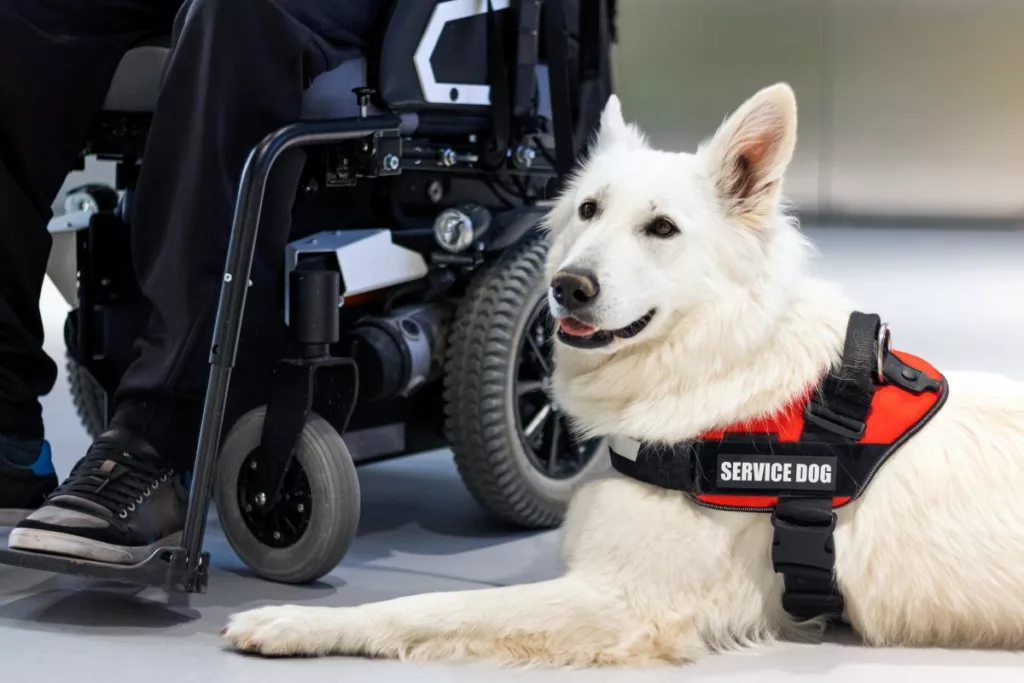The Assistance Dog Special Allowance (ADSA) program provides a $50 monthly payment to help eligible individuals cover the costs of caring for a guide, signal, or service dog. This financial support can go toward essentials like food, grooming, and veterinary care. In this guide, we’ll explain the eligibility criteria, how to apply, and the positive impact a service dog can have on your daily life.

What qualifies as an assistance dog?
A service dog is more than just a companion – it is specifically trained to assist individuals with disabilities by performing tasks that help improve their quality of life. Unlike emotional support animals (ESAs), which provide comfort and companionship, service dogs are trained to carry out essential duties, such as guiding individuals with visual impairments, alerting those with hearing loss, or providing physical support.
Service dogs play a critical role in enhancing personal safety, independence, and overall well-being for individuals living with mental or physical health conditions. While emotional support animals can help alleviate symptoms of anxiety and depression, service dogs are recognized for their ability to directly assist with specific tasks that mitigate the effects of a disability, making them an essential part of many treatment and care plans.
Can the state help me get a service dog?
No. The state of California will help you by supporting the ongoing costs associated with homing a service dog. You could be eligible for a $50 monthly allowance to help pay for food, vet checkups, and regular grooming of your dog.
What is an ESA letter and how do I apply for one?
An official ESA letter is issued by a state-certified mental health professional who has been seeing you and treating you for a minimum of 30 days. The therapist will use this time to assess the degree to which your mental health impacts your daily life and the likelihood you will recover without the use of outside intervention. Common conditions they will look at include:
- General anxiety that prevents you from working or living a full life outside of work
- Depression that rarely or never seems to lift and prevents you from working regularly
- More complex issues such as personality disorders that impair emotional regulation
- PTSD, CPTSD, and other forms of unprocessed trauma that result in aggression
There are three main pathways that you can use to apply for your ESA letter:
- California residents should complete a ADSA1 form if they are receiving:
- Supplemental Security Income (SSI)
- State Supplementary Payment (SSP)
- In-Home Support Services (IHSS),
- Cash Assistance Program for Immigrants (CAPI)
- Those in receipt of Social Security Disability Insurance (SSDI) benefits will instead need to complete a ADSA – SSDI Recipients (Form ADSA1B) form
- Those already taking home ADSA benefits and who now need to renew will need to use the ADSA1A form
How can I get the ADSA allowance?
Applications follow a step-by-step process:
- Select the right ADSA form from the previous section of this guide
- Provide your Social Security Number, full name and address
- Add details of your dog (age, weight, breed, etc.)
- Include a summary of your current condition
All forms should be mailed to:
Assistance Dog Special Allowance Program
California Department of Social Services
744 P Street, MS 9-11-91
Sacramento, CA 95814
You will then be seen by a mental health professional who will be able to take a more in-depth look and decide whether ESA is the right approach for your individual needs.
👉 For those looking for further information, a fact sheet that outlines additional key points is also available.
Is the ESA application process right for me?
The decision to welcome a service dog into your life is deeply personal, and may not be suited to everyone. For example, if you have been injured at work and your mental health has deteriorated as a result, you may find you are better served by looking at the state’s workplace compensation program.
You can call (916) 657-2628 or email [email protected] for further advice on everything from making your application to deciding whether the program is right for you in the first place.
Reclaiming quality of life with a California service dog
Reducing the cost of owning a service or support dog can greatly aid in managing mental health conditions like anxiety and depression. The bond formed with these animals can improve well-being, providing comfort and security while also promoting recovery.
Service dogs also assist individuals with physical disabilities, enhancing mobility and independence. If you’re considering a service dog, resources are available to help you find, train, and register the right companion to improve your quality of life.
FAQ’s
1. How long will it take to get an ESA?
While the mental health professional needs to have known you for at least 30 days, you will receive the ESA letter within just 1-2 days of an official assessment.
2. Can my landlord turn my ESA away?
No, the Fair Employment and Housing Act means that landlords must allow all service animals to live at a rented residence regardless of the wording in the housing contract.
3. What happens to my dog if and when I recover?
The dog is your property and not owned by the state — you are merely receiving financial support in the cost of caring for it. You can call (916) 657-2628 or write to [email protected] to notify the state about a change in circumstances.





